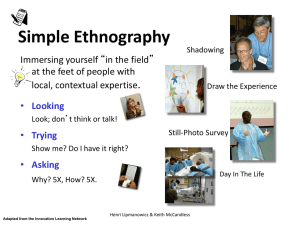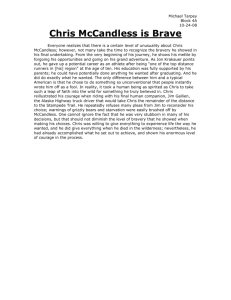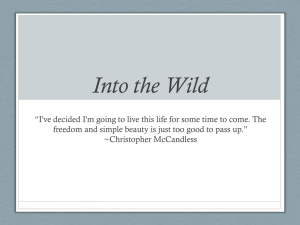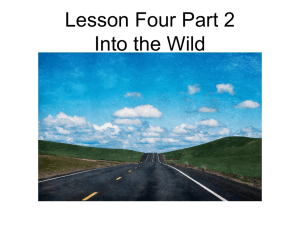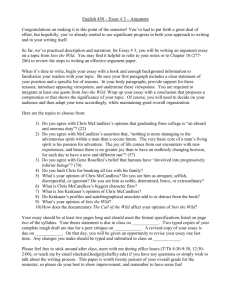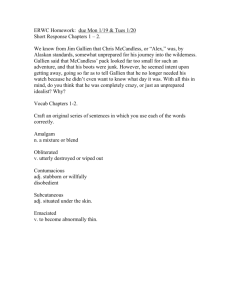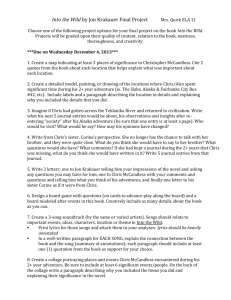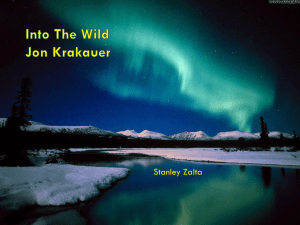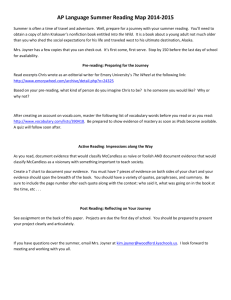Into the Wild multiple choice test.doc
advertisement
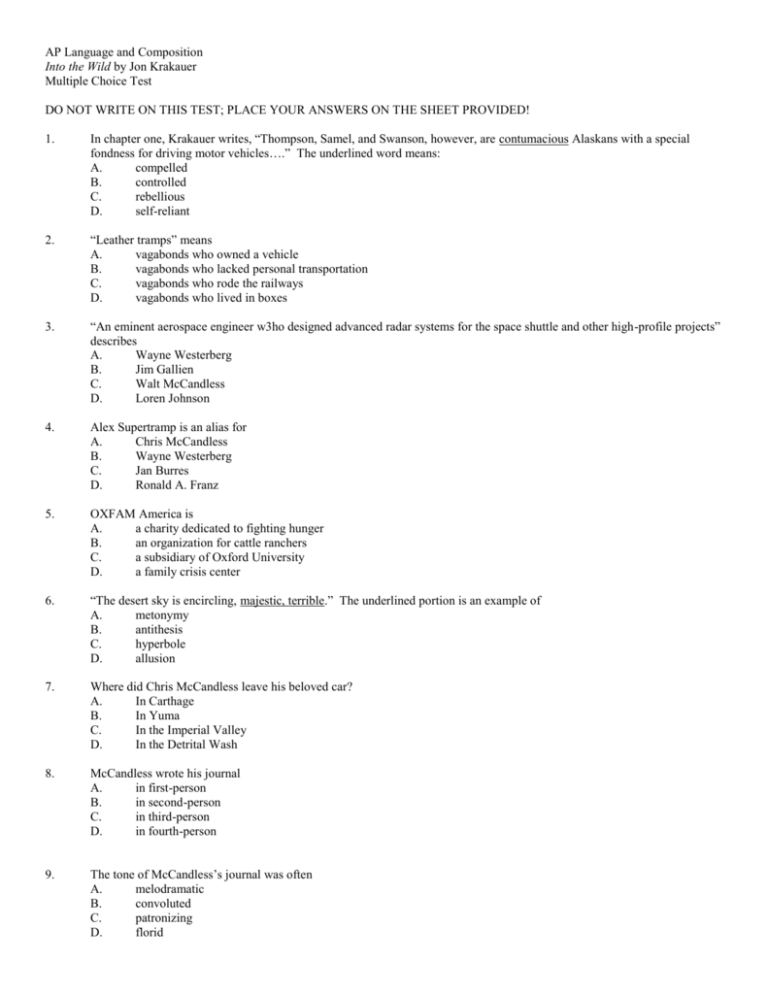
AP Language and Composition Into the Wild by Jon Krakauer Multiple Choice Test DO NOT WRITE ON THIS TEST; PLACE YOUR ANSWERS ON THE SHEET PROVIDED! 1. In chapter one, Krakauer writes, “Thompson, Samel, and Swanson, however, are contumacious Alaskans with a special fondness for driving motor vehicles….” The underlined word means: A. compelled B. controlled C. rebellious D. self-reliant 2. “Leather tramps” means A. vagabonds who owned a vehicle B. vagabonds who lacked personal transportation C. vagabonds who rode the railways D. vagabonds who lived in boxes 3. “An eminent aerospace engineer w3ho designed advanced radar systems for the space shuttle and other high-profile projects” describes A. Wayne Westerberg B. Jim Gallien C. Walt McCandless D. Loren Johnson 4. Alex Supertramp is an alias for A. Chris McCandless B. Wayne Westerberg C. Jan Burres D. Ronald A. Franz 5. OXFAM America is A. a charity dedicated to fighting hunger B. an organization for cattle ranchers C. a subsidiary of Oxford University D. a family crisis center 6. “The desert sky is encircling, majestic, terrible.” The underlined portion is an example of A. metonymy B. antithesis C. hyperbole D. allusion 7. Where did Chris McCandless leave his beloved car? A. In Carthage B. In Yuma C. In the Imperial Valley D. In the Detrital Wash 8. McCandless wrote his journal A. in first-person B. in second-person C. in third-person D. in fourth-person 9. The tone of McCandless’s journal was often A. melodramatic B. convoluted C. patronizing D. florid 10. One of McCandless’s literary heroes was A. Emily Dickinson B. Shakespeare C. Henry David Thoreau D. Homer “The Slabs” was A. an old navy base where people could live cheap during the winter B. a section of the Grand Canyon near where McCandless left his car C. an old trailer park where Jan and Bob lived D. the tavern that Wayne Westerberg owned 12. 11. Lumpen means A. degraded and contemptible B. choppy C. filled or covered with lumps D. a mass of indefinite size or shape 13. Ronald A. Franz was A. the forest Ranger who found McCandless’s body B. a trucker who gave McCandless a ride to Alaska C. an 80-year-old accomplished leatherworker D. an aging hippie 14. Fulminate means A. to apply smoke, vapor, or gas expesially for the purpose of disinfecting B. to illumine C. to utter or send our censure or condemnation D. to wrap or roll close to or around something 15. The only person in McCandless’s family with whom he got along well was A. his mother B. his father C. his step-mother D. his sister 16. In the sentence, “McCandless may have been tempted by the succor offered by women,” the underlined word means A. sex B. comfort C. hope D. fantasy 17. Something that surprised Wayne Westerberg on McCandless’s final night in Carthage was A. McCandless gave Westerberg all hs money B. Westerberg discovered McCandless was an accomplished pianst C. McCandless called his parents one last time D. McCandless didn’t drink that night 18. Opprobrium means A. opportunity B. strong disapproval C. unprepared C. wealth 19. As far as being prepared for an odyssey in Alaska, some people felt McCandless was A. supercilious B. superfluous C. supereminent D. superannuated 20. One critic of McCandless wrote, “McCandless freezes because he ignores advice and commits big-time hubris.” The underlined word means A. mistakes B. arrogance C. misinterpretations of the obvious D. anarchy 21. In the phrase, “a diary filled with incoherent ranting about truth and beauty and recondite ecological theory…” the underlined word means A. reputable B. concealed C. adversarial D. sardonic 22. Krakauer gives examples of other adventurers whose lives paralleled that of Chris McCandless. Carl McCunn, a 35-year-old amateur photographer died A. by falling through a thin snow bridge and plummeted to his death B. by starvation C. by neglecting to arrange for a pilot to fly him back to civilization at summer’s end D. when the cabin he was staying in caught fire and burned to the ground 23. At Davis Gulch A. McCandless inscribed a brief poem on the canyon wall B. John Waterman became the youngest person to scale the canyon walls C. Everett Ruess mysteriously disappeared D. Ansel Adams began his photography career 24. Wayne Westerberg was able to help the Alaska State Troopers identify Chris McCandless A. because he knew Sam McCandless from their college days B. by giving the story to Paul Harvey to air on the radio C. by providing them with McCandless’s Social Security number D. by sending the troopers a picture of Westerberg and McCandless together 25. “Chris marches to a different drummer” is an example of A. allusion B. paradox C. allegory D. parallelism 26. On weekends, when his high school pals were attending “keggers” and trying to sneak into Georgetown bars, McCandless would A. diligently study in the university library B. wander the streets trying to help prostitutes and homeless people C. drink quietly in his dorm room D. spend time with his sister Carine Billie thought it was ironic that McCandless believed that “wealth was shameful, corrupting, inherently evil” because A. “Chris was a natural-born capitalist with an uncanny knack for making a buck.” B. “Chris was a child of privilege.” C. “Chris was studying to be a lawyer.” D. “Chris was really wanted to make a difference in the world.” 27. 28. The title of the book, Into the Wild, comes from A. a line in a Jack London novel B. a line in the last note McCandless wrote to Westerberg C. a line from Thoreau’s Walden Pond D. the mind of the author, Jon Krakauer 29. When Krakauer began his journey to climb Devil’s Thumb in Alaska, be bought what to keep him from falling into an icy abyss? A. crampons B. ten-foot curtain rods C. ice picks D. D-rings 30. “The siren song of the void puts you on edge” is an example of A. paradox B. metonymy C. D. allusion allegory 31. When Krakauer attempted to climb Devil’s Thumb, what stopped him from climbing the north wall? A. He ran out of supplies and had to turn back. B. A blizzard stranded him for so long he ran out of sustainable energy. C. He ran out of finger holds. D. His rope broke. 32. While waiting to make his second attempt at climbing Devil’s Thumb, the author A. made several short ski trips of reconnaissance B. wrote copious notes in his journal C. read, smoked, and nearly burned his tent down D. thought about his girlfriend who was waiting back in Fairbanks 33. The author’s relationship with his father was A. amicable B. animus C. ardent D. argentic 34. When McCandless crossed the Teklanika River, the author writes, “he was crossing his Rubicon.” What does this phrase mean? A. McCandless was making the sign of the cross. B. McCandless made a puzzling decision like a Rubik’s cube C. McCandless made an irrevocable decision D. McCandless was clueless about what was in store 35. McCandless was determined “to become lost in the wild.” What was ironic, then, about his sojourn at the bus? A. It was actually less than sixteen miles from civilization. B. The bus was well stocked with food and supplies. C. Hunters stopped by frequently and shared their food with McCandless D. McCandless had thoroughly prepared and didn’t suffer. What happened when McCandless attempted to return to civilization? A. He got hopelessly lost. B. The Teklanika river was a full flood stage and he was a weak swimmer. C. He ran into hunters who stole his food and left him for dead. D. He decided to head over to the other side of the mountain and got caught in a spring snow storm. 36. 37. The author compares McCandless’s “sin of arrogance” with that of A. Jack London B. Henry David Thoreau C. Sir John Franklin D. Sir Walter Scott 38. Most of McCandless’s journal entries written during the time he lived in the wild are about A. food B. nature C. the dangers of capitalism D. his desire to be his own person 39. Chris McCandless, the author believes, died from A. toxic wild sweet pea seeds B. toxic wild potato seeds C. toxic mushrooms D. toxic berries 40. What does Billie McCandless leave at the bus? A. Pictures of Chris B. A copy of Thoreau’s Walden Pond. C. A suitcase stocked with survival supplies as well as a Bible D. A set of topographical maps Chris McCandless A. A. adventure and wrote was an explorer in Alaska. B. B. Was a highly trained mountain climber. C. C. Died of starvation. D. D. Survived his Alaska adventure and wrote Into the Wild. E. E. Died from injuries sustained in a fall from Mt. McKinley. Chris McCandless referred to himself as A. A. Alexander Supertramp. B. B. A leather tramp. C. C. A rubber tramp. D. D. King of the Hill. E. E. The New Tolstoy McCandless’s old yellow Datsun was A. A. Taken by troopers and sold at an auction. B. B. Used in drugs raids in Arizona. C. C. Abandoned in Alaska. D. D. Wrecked when he tried to cross a river in it. E. E. Abandoned after he drove it to Mexico. Ron Franz A. A. Urged McCandless to go back to school. B. B. Offered to ay for McCandless to enter law school. C. C. Thought McCandless was mentally ill and tried to avoid him. D. D. Taught McCandless the craft of leatherworking. E. E. Drove McCandless into Canada. Wayne Westerberg A. A. reported that McCandless was a slacker as an employee. B. B. Pai MCCandless to work at his grain elevator. C. C. Had just been released from jail when McCandless met him D. D. Knew Ron Franz and met McCandless through him. E. E. Was a much older man who tried to give McCandless advice. Jon Krakauer suggests that McCandless considered Westerberg a friend; this conclusion is based, in part, on the fact that A. A. Westerberg told the author this in an interview. B. B. McCandless repeatedly placed collect calls to Westerberg after leaving Carthage. C. C. McCandless continued to send Westerberg post cards and leters after leaving Carthage. D. D. McCandless asked Ron Franz to take him to see Westerberg. E. E. McCandless named Westerberg on a list of friends in his journal. The journal McCandless kept in Mexico A. A. Did not include dates, so no one could reconstruct his trip there. B. B. Was written in the third person, as if he was observing the action from a distance. C. C. Revealed heavy drug use. D. D. Showed that he was ambivalent about going to Alaska. E. E. Was mostly about what kind of Mexican food he preferred. Oh-My-God Hot Springs A. A. was a “bizarre” scene where people camped for the winter. B. B. Had been a prosperous suburb until the wells ran dr. C. C. Required people to registar with the polise before sing the springs. D. D. Was where McCandess abandoned his car. E. E. Was a resort area where McCandless worked at McDonald’s. Krakauer inserts stories of several people who went to the wilderness because he wants to show that A. B. C. D. E. A. B. C. D. E. many people behave irresponsibly. McCandless was not alone in feeling the call f the wilderness. People who go into the wilderness invariably die. So many people are in the wilderness that loneliness is not a factor. Only the mentally ill embark on wilderness adventures. When the newspapers ran stories about the dead hiker A. A. The police already knew it was McCandless. B. B. The detective hired by McCandless’s parents provided police with the hiker’s name. C. C. Ron Franz gave the police the hiker’s name. D. D. He was indentified from pictures in his personnel file at McDonald’s. E. E. Wayne Westerberg convinced the police that the hiker had worked for him. Walt McCandless A. A. is a college dropout who invented a new kind of radar. B. B. Is a high-achieving and very demanding person. C. C. Fathered only two children. D. D. Was a government bureaucrat for twenty years. E. E. Is a hippie who spends months at a tie in the wilderness. “The doors had been left unlocked…a set of jumper cables, twenty-five pounds of rice, and in the glove compartment, the keys to the vehicles ignition.” (26) It can be inferred from the description of the belongings left inside the vehicle that… A. A. McCandless tried to salvage what he could. B. B. McCandless intended in coming back. C. C. McCandless purposely left those items for someone else to find. D. D. McCandless was preserving his items for safekeeping. E. E. McCandess wanted none of his worldly possesions The author’s attitude towards the speaker could best be characterized as… A. A. Understanding B. B. Resentful C. C. Mildly Disgusted D. D. Forgiving E. E. Enraged The shift in the personality of McCandless has the effect of.. A. A. changing the reader’s perspective. B. B. Showing McCandless’ caring side. C. C. Introduce new characters. D. D. Show family relationships. E. E. Describe a different P.O.V. What attitude does McCandless portray in Chapter One? A. A. Anger B. B. Self-assuredness C. C. Sorrow D. D. Amusement E. E. Apathy It can be inferred from the description of Carine that… A. B. C. D. E. A. B. C. D. E. Chris felt no obligation to wealth. Carine was susceptible to wealth. Chris was overly ambitious from self-reliance. Carine neglected her feelings for prosperity. Chris reacted to his parents negativity like Carine. Which of the following best describes why Chris was happy at his graduation but decided to run off? A. A. He wanted to find his place in the world. B. B. He became entangled in his endeavors or nature. C. C. He was obtaining revenge by creating worrisome feelings for his family. D. D. He was independent and could explore life for himself. E. E. He hated the idea of telling his family that he would leave. Which of the following best justifies the purpose of Chapter 13 “Virginia Beach” Preassessment Name: ________________________________ Directions: Read the “Song of Myself” by Walt Whitman and the letter written by Chris “Alex” McCandless published in Jon Krakauer’s book Into the Wild. Answer the questions following to the best of your ability. Song of Myself 1 I CELEBRATE myself, and sing myself, And what I assume you shall assume, For every atom belonging to me as good belongs to you. I loafe and invite my soul, I lean and loafe at my ease observing a spear of summer grass. My tongue, every atom of my blood, form'd from this soil, this air, Born here of parents born here from parents the same, and their parents the same, I, now thirty-seven years old in perfect health begin, Hoping to cease not till death. Creeds and schools in abeyance, Retiring back a while sufficed at what they are, but never forgotten, I harbor for good or bad, I permit to speak at every hazard, Nature without check with original energy. 6 A child said What is the grass? fetching it to me with full hands; How could I answer the child? I do not know what it is any more than he. I guess it must be the flag of my disposition, out of hopeful green stuff woven. Or I guess it is the handkerchief of the Lord, A scented gift and remembrancer designedly dropt, Bearing the owner's name someway in the corners, that we may see and remark, and say Whose? Or I guess the grass is itself a child, the produced babe of the vegetation. Or I guess it is a uniform hieroglyphic, And it means, Sprouting alike in broad zones and narrow zones, Growing among black folks as among white, Kanuck, Tuckahoe, Congressman, Cuff, I give them the same, I receive them the same. And now it seems to me the beautiful uncut hair of graves. Tenderly will I use you curling grass, It may be you transpire from the breasts of young men, It may be if I had known them I would have loved them, It may be you are from old people, or from offspring taken soon out of their mothers' laps, And here you are the mothers' laps. This grass is very dark to be from the white heads of old mothers, Darker than the colorless beards of old men, Dark to come from under the faint red roofs of mouths. O I perceive after all so many uttering tongues, And I perceive they do not come from the roofs of mouths for nothing. I wish I could translate the hints about the dead young men and women, And the hints about old men and mothers, and the offspring taken soon out of their laps. What do you think has become of the young and old men? And what do you think has become of the women and children? They are alive and well somewhere, The smallest sprout shows there is really no death, And if ever there was it led forward life, and does not wait at the end to arrest it, And ceas'd the moment life appear'd. All goes onward and outward, nothing collapses, And to die is different from Into the Wild 10 what any one supposed, and luckier. 52 The spotted hawk swoops by and accuses me, he complains of my gab and my loitering. I too am not a bit tamed, I too am untranslatable, I sound my barbaric yaws over the roofs of the world. The last scud of day holds back for me, It flings my likeness after the rest and true as any on the shadow'd wilds, It coaxes me to the vapor and the dusk. I depart as air, I shake my white locks at the runaway sun, I effuse my flesh in eddies, and drift it in lacy jags. I bequeath myself to the dirt to grow from the grass I love, If you want me again look for me under your boot-soles. You will hardly know who I am or what I mean, But I shall be good health to you nevertheless, And filter and fibre your blood. Failing to fetch me at first keep encouraged, Missing me one place search another, I stop somewhere waiting for you. Into the Wild 11 Alex here. I have been working up here in Carthage South Dakota for nearly two weeks now. I arrived up here three days after we parted in Grand Junction, Colorado. I hope that you made it back to Salton City without too many problems. I enjoy working here and things are going well. The weather is not very bad and many days are surprisingly mild. Some of the farmers are even already going out into their fields. It must be getting rather hot down there in Southern California by now. I wonder if you ever got a chance to get out and see how many people showed up for the March 20 Rainbow gathering there at the hot springs. It sounds like it might have been a lot of fun, but I don’t think you really understand these kind of people very well. I will not be here in South Dakota very much longer. My friend, Wayne, wants me to stay working at the grain elevator through May and then go combining with him the entire summer, but I have my soul set entirely on my Alaskan Odyssey and hope to be on my way no later than April 15. That means I will be leaving here before very long, so I need you to send any more mail I may have received to the return address listed below. Ron, I really enjoy all the help you have given me and the times that we spent together. I hope that you will not be too depressed by our parting. It may be a very long time before we see each other again. But providing that I get through this Alaskan Deal in one piece you will be hearing from me again in the future. I’d like to repeat the advice I gave you before, in that I think you really should make a radical change in your lifestyle and begin to boldly do things which you may previously never have thought of doing, or been too hesitant to attempt. So many people live within unhappy circumstances and yet will not take the initiative to change their situation because they are conditioned to a life of security, conformity, and conservatism, all of which may appear to give one peace of mind, but in reality nothing is more damaging to the adventurous spirit within a man than a secure future. The very basic core of a man’s living spirit is his passion for adventure. The joy of life comes from our encounters with new experiences, and hence there is no greater joy than to have an endlessly changing horizon, for each day to have a new and different sun. If you want to get more out of life, Ron, you must lose your inclination for monotonous security and adopt a helter-skelter style of life that will at first appear to you to be crazy. But once you become accustomed to such a life you will see its full meaning and its incredible beauty. And so, Ron, in short, get out of Salton City and hit the Road. I guarantee you will be very glad you did. But I fear that you will ignore my advice. You think that I am stubborn, but you are even more stubborn than me. You had a wonderful chance on your drive back to see one of the greatest sights on earth, the Grand Canyon, something every American should see at least once in his life. But for some reason incomprehensible to me you wanted nothing but to bolt for home as quickly as possible, right back to the same situation which you see day after day after day. I fear you will follow this same inclination in the future and thus fail to discover all the wonderful things that God has placed around us to discover. Don’t settle down and sit in one place. Move around, be nomadic, make each day a new horizon. You are still going to live a long time, Ron, and it would be a shame if you did not take the opportunity to revolutionize your life and move into an entirely new realm of experience. You are wrong if you think Joy emanates only or principally from human relationships. God has placed it all around us. It is in everything and anything we might experience. We just have to have the courage to turn against our habitual lifestyle and engage in unconventional living. My point is that you do not need me or anyone else around to bring this new kind of light in your life. It is simply waiting out there for you to grasp it, and all you have to do is reach for it. The only person you are fighting is yourself and your stubbornness to engage in new circumstances. Ron, I really hope that as soon as you can you will get out of Salton City, put a little camper on the back of your pickup, and start seeing some of the great work that God has done here in the American West. You will see things and meet people and there is much to learn from them. And you must do it economy style, no motels, do your own cooking, as a general rule spend as little as possible and you will enjoy it much more immensely. I hope that the next time I see you, you will be a new man with a vast array of new adventures and experiences behind you. Don’t hesitate or allow yourself to make excuses. Just get out and do it. Just get out and do it. You will be very, very glad that you did. TAKE CARE RON, ALEX Please write back to: Alex McCandless Madison, SD 57042 1. What is the primary theme that resonates in both Whitman’s poem and McCandless’ letter? A. B. C. D. 2. God is everywhere and nature has God in everything around man. Life ends with the inevitability of death like leaves of grass dying in the autumn. People never truly life until they live as a nomad who travels from place to place. Celebrate yourself as you individually relate to nature and the world around you. Which of the following lines of Whitman’s poem most closely correlates to the following advice that McCandless gives Ron Franz in the passage below? Into the Wild 12 And you must do it economy style, no motels, do your own cooking, as a general rule spend as little as possible and you will enjoy it much more immensely. A. B. C. D. 3. I stop somewhere waiting for you. I CELEBRATE myself, and sing myself, I too am not a bit tamed, I too am untranslatable, I harbor for good or bad, I permit to speak at every hazard, Which of Whitman’s symbols below mostly closely compares to McCandless’ advice he gives Ron Franz in the following passage: I think you really should make a radical change in your lifestyle and begin to boldly do things which you may previously never have thought of doing, or been too hesitant to attempt. A. B. C. D. 4. Which of the following statements best identifies McCandless’ & Whitman’s belief in nature? A. B. C. D. 5. Grass Handkerchief Child Spotted Hawk Nature, from the smallest sprout of grass to the largest canyon, is an important creation of God to be explored by man. Nature inevitably dies at the end of the cycle of life just like the spirit of man too has an end. Nature calls to mankind to explore, move about nature, and shun societal constraints that harbor negativity. Nature is a religion within itself that all mankind in one way or another celebrates within his self. Based on McCandless’ letter, what can you infer is his position on Whitman’s use of the word “luckier” in the following couplet? All goes onward and outward, nothing collapses, And to die is different from what any one supposed, and luckier. A. B. C. D. 5. McCandless would argue that death is a terrible inevitability that ends the journey of the individual. McCandless would argue that death’s reach yanks the individual out of the joys of life. McCandless would agree that Whitman suggests that to truly live is to never accept death. McCandless would agree that death itself is an extension of the celebrated journey of life. Whitman’s use of the grass sprout as a symbol for the divine within everything can also be seen in which of the following passages from McCandless? A. B. C. D. You really should make a radical change in your lifestyle and begin to boldly do things which you may previously never have thought of doing. God has placed it all around us. It is in everything and anything we might experience. Once you become accustomed to such a life you will see its full meaning and its incredible beauty. Don’t settle down and sit in one place. Move around, be nomadic, make each day a new horizon. Into the Wild 13 1. What were some of the early influences in Chris McCandless’ life that may have led him to strike out on daring odysseys across the USA? What was the family secret that Chris unearthed in his first foray across the USA? How did this affect him? On a Friday night in high school, McCandless and his friend go “out on the town”—A) what do they do and B) on what does McCandless spend his $10? Name two ways Chris made money when he was younger: To what charity did Chris donate his school fund? Why is this ironic? A OXFAM because he dies from starvation. B PETA because he kills wild animals. C ACA because he is diagnosed with cancer. D What is Oh-My-God-Hot Springs? Describe it. 1. Describe the belt that McCandless made at Franz’s house. What does Ron Franz do as a result of Chris’ advice to him? A He promises to heed Chris’ advice but never moves out onto the road. B He disagrees with Chris at first but eventually moves out to the road. C He realizes he is too old to truly survive on the road and stays. D He moves to Alaska and begins his own journey into the wild. 2. List one of the two “normal” jobs McCandless has during this section of the book. By normal I mean you have to show up every day and work a usual workday schedule. What sort of relationship does Chris’ have with his father? A Chris understands his father’s motivation of living a double life. B Chis loathes his father for living a lie for so long. C Chris loves his father and needs to get away to think about his life. D Chris ignores his father’s past infidelities and learns to trust his decisions. 3. When McCandless works in South Dakota for Westerberg, where does he work and what does he do? Into the Wild 14 What particular talent does McCandless display while with the Burres family at the swap meet and again at a bar with Westerberg and crew? A dancing B singing C rodeoing D swimming What happens to McCandless’ yellow Datsun? A Deserted by Chris and found by police who used it as an undercover drug vehicle B Washed away by Chris and found by the McCandless’ private investigator C Found by the police who ran the plates and reported the vehicle to the McCandless D Donated to OXFAM to run food to poor familes across the southwest
